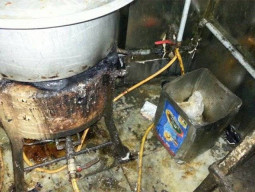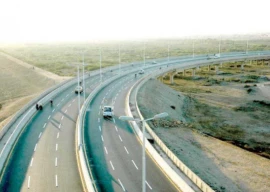
Red-light? I thought hopefully. The car was slowing down until the only motion was the start-stop jerking of a donkey cart pulled by a disillusioned ass. No, we were a mile from the Korangi Road-Ittehad intersection signal.
I found myself in a wall of unmoving traffic. The oil-tankers and buses that frequent this road had formed a tight casing around me. I couldn't see anything for more than a foot on all sides. Entombed in an amalgam of traffic I hoped for the best — maybe a truck had overturned at the roundabout. Just then, putrid smoke ticked my nostrils. Burning tyres. Either someone had been shot, or some utility was up to its old tricks again. I was stuck and the latter turned out to be true.
Residents of Manzoor Colony, Kashmir Colony, Akhtar Colony and their surrounding areas were gathered on the road to protest water shortages. They held up empty, crumbling, water pots — a metaphor for the lack of water. Main routes leading to Korangi, Defence and Mehmoodabad were blocked for at least two hours.
My driver had already ducked out of the car and made friends with the nearest rickshaw driver. He reported back to me at regular intervals, mostly direct excerpts from the rickshaw driver's rants about how he was losing customers. The buses around me weren't faring any better, once the passengers realised the jam was not going to let up, they dismounted and decided to go on foot. The motorcycles riders, however, shot us gloating looks as they wiggled through the maze of traffic, over the pavement and sped away. Behind me, a disgruntled businessman in a shiny Liana was barking orders at someone on the phone, his blazer hung on the back window — I assumed he was late for a meeting.
Some, like Nadia Ansari, almost drove straight into the brouhaha. "My mother was driving, when we reached Khayaban-e-Ittehad from Khayaban-e-Jami, we saw that the road, which is usually jam-packed from 4 pm to 5 pm, was deserted," she told The Express Tribune. "A few frowning people were gazing helplessly at something. We turned left, slowly, to go towards the Korangi Road signal, when I yelled, 'The road is blocked!' Around eight young men with hockey clubs had blocked the main artery with bricks and thorny branches.
I rolled down my window and asked a bystander what was going on. 'It's some protest,' he said, shrugging his shoulders. He paused, looked towards the protesters' direction and said, 'You'd better leave otherwise they'll break your windows.' We turned and saw them walking towards us — fast. My mother sped away as fast as she could."
The protesters shouted anti-water board and government slogans. The police arrived at about 6:30 pm. Never before was the sound of sirens greeted with such exultation.
The Defence police SHO Ejaz Khawaja, told The Express Tribune that the protest was a peaceful one and the residents only burnt tyres. Karachi Water and Sewerage Board (KWSB) officials reached the site and promised to reopen the water supply, upon which the beleaguered residents dispersed. Before they left, they warned the officials that they would return to the roads if the KWSB stopped the supply again.
Akhtar Colony residents have been lamenting their lot for a while now. On October 21, 2010, hundreds of protesters had main Korangi Road blocked for over an hour. That was the third protest over water shortages in a week.
With additional information from Faraz Khan
Published in The Express Tribune, April 23rd, 2011.

















COMMENTS (2)
Comments are moderated and generally will be posted if they are on-topic and not abusive.
For more information, please see our Comments FAQ